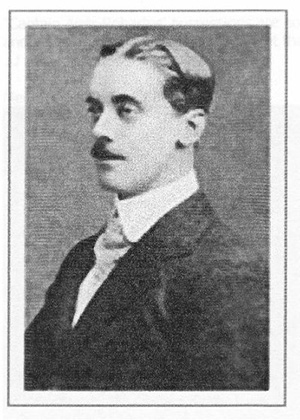Thomas Charles Reginald was the eldest son and heir of Thomas Charles 6th Viscount Clifden, and his wife Mary (nee Dickenson) of Lanhydrock, Bodmin, Cornwall and of Wimpole Hall, Cambridgeshire.
He was educated at Eton (in Miss J M Evan's House), leaving in 1899, and Christ Church, Oxford and elected a Liberal Member of Parliament for Bodmin in the 1906 general election, but lost his seat in June 1906 following a controversial election petition by the defeated candidate alleging illegal payments to potential voters. He was elected to the St Austell Division of Cornwall in a by-election in 1908 and held the seat until his death.
At the outbreak of the war, Thomas was a volunteer in the Devon Yeomanry. Desperate to get to the front he joined the Royal Bucks Hussars (gazetted 19 September 1914 as Second Lieutenant) who, to his horror, were stationed in England. Thomas then joined the Coldstream Guards, gazetted 5 January 1915 as Lieutenant, and embarked for France on 13 February 1915.
“Tommy Robartes was a remarkable man - devoid of fear”, according to his brother officer Lt G Barry, who recounts a remarkable musical escapade in Chapter 29 of Lyn MacDonald’s book “1915 - The Death of Innocence”.
“Robartes wanted to form a band in his company of Coldstream Guards, and on home leave bought the necessary instruments to do so. The band, a little ensemble of about 10 players, became so good that they were allowed to accompany route marches.
“However, Tommy had sworn revenge for the loss of two sergeants during an eventful spell in the line, and he decided that the band would be the best means to settle the score. He advertised a musical entertainment in German, which they stuck above the parapet. The show would start at midnight, which indeed it did, and the Germans were treated to plenty of music to their liking, such as “The Watch on the Rhine“.
“However, what the Germans didn’t know was that our front line had been evacuated, and the artillery had been primed to let rip on the opposing trenches three minutes into the concert. To cut several pages of Miss MacDonald’s account short, Tommy exacted his revenge on 4th August 1915”.
“Final Campaign It was at Loos that for the first time large numbers of men from Kitchener’s Army - the wartime volunteers of 1914 - would fight and die in a major battle. It was a battle that would consume senior officers, war poets, sons of the gentry and public figures, and thousands of humble Tommies who felt this might be the ‘Big Push’ which would break the stranglehold of trench warfare.
It was not to be, and in the two and a half weeks of bitter fighting here in September and October 1915, more than 20,000 British soldiers would die.”
 Tommy died on 39 September 1915 from wounds received from sniper fire on 28 September while bringing in a wounded private from no man’s land during the Battle of Loos (after an attack on Hill 70). He had apparently already saved a sergeant and was recommended for the Victoria Cross. Mentioned in Dispatches 1915.
Tommy died on 39 September 1915 from wounds received from sniper fire on 28 September while bringing in a wounded private from no man’s land during the Battle of Loos (after an attack on Hill 70). He had apparently already saved a sergeant and was recommended for the Victoria Cross. Mentioned in Dispatches 1915.
He left an Estate of £3,638.6.1d. Probate granted to Hon Francis Gerald Agar-Robartes.
“A trunk containing the military and personal effects of a British officer killed in action during the First World War, was carefully packed away in an attic in Cornwall by his grief-stricken mother, after he died saving an injured comrade in the First World War. In 1999, the belongings of Captain Tommy Agar Robartes were found perfectly preserved after gathering dust for 84 years in the attic of his former home, Lanhydrock House in Cornwall.
“National Trust property manager, Andrea Marchington, opened the trunk. “Inside there were some of the things he used in the trenches. A trench periscope, a monocular, his sword, walnut talc holder, moustache comb, a tiny silver spirit lamp, and a little drinking cup inside a leather case, also made of silver. Everything beautifully made, each with its own case, and giving a rare insight into a serving officer’s life.
“Captain Agar-Robartes’ possessions are now on permanent display at Lanhydrock and act as a poignant reminder of life at the time of the first Great War.” [BBC 11 November 1999 and others.]
Captain Agar-Robartes is remembered on a memorial at Truro Cathedral, at Wimpole, and Church Norton.

